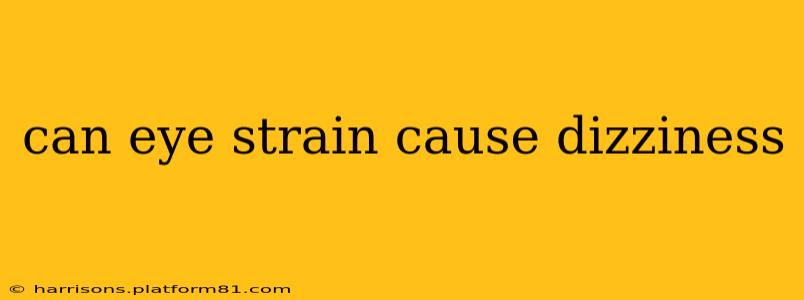Can Eye Strain Cause Dizziness? Understanding the Connection Between Vision and Vertigo
Eye strain, that uncomfortable feeling of tired, achy eyes, is a common complaint in our screen-saturated world. But did you know it can sometimes be linked to dizziness? While not always a direct cause, eye strain can certainly contribute to feelings of vertigo and imbalance, especially in susceptible individuals. Let's delve into the relationship between eye strain and dizziness, exploring the reasons why this connection exists and what you can do about it.
What is Eye Strain?
Before we explore the link to dizziness, let's define eye strain. Eye strain, also known as asthenopia, is a condition characterized by discomfort or fatigue in and around the eyes. Common symptoms include:
- Aching or burning eyes: This is often the most prevalent symptom.
- Headaches: Frequently located in the forehead or temples.
- Blurry vision: Vision may become temporarily unclear.
- Dry eyes: Reduced tear production or excessive evaporation can contribute to eye strain.
- Neck and shoulder pain: Prolonged eye strain often leads to muscle tension in the neck and shoulders.
These symptoms are often exacerbated by prolonged near-work activities like reading, using computers, or looking at smartphones.
How Can Eye Strain Lead to Dizziness?
The connection between eye strain and dizziness isn't always straightforward. It's not a direct causal link in most cases, but rather an indirect relationship mediated by several factors:
-
Vergence-Accommodation Dysfunction: Our eyes constantly adjust focus (accommodation) and alignment (vergence) to see clearly. Prolonged near work can overwork these mechanisms, leading to eye strain. This strain can then trigger imbalances in the signals sent to the brain, affecting its perception of spatial orientation and causing dizziness or vertigo. Think of it as a miscommunication between your eyes and your brain's balance center.
-
Muscle Tension: As mentioned earlier, eye strain often leads to tension headaches and neck and shoulder pain. This muscle tension can affect the vestibular system – the inner ear system responsible for balance – indirectly triggering feelings of dizziness.
-
Underlying Conditions: In some cases, dizziness associated with eye strain might indicate an underlying condition like convergence insufficiency (difficulty focusing both eyes on a single point) or other refractive errors that are worsening the strain. Addressing these underlying issues is crucial.
Can Eye Strain Cause Vertigo?
While eye strain itself isn't a direct cause of vertigo (the sensation of spinning), the associated muscle tension and vergence-accommodation issues can certainly contribute to or exacerbate vertigo symptoms. If you experience significant vertigo alongside eye strain, it's important to seek professional medical attention to rule out other potential causes.
What are the Symptoms of Eye Strain?
This question has been addressed above, under the section "What is Eye Strain?". The symptoms largely revolve around discomfort in and around the eyes, including aching, burning, blurry vision, headaches, and muscle tension.
How do I Treat Eye Strain to Prevent Dizziness?
Managing eye strain is crucial in mitigating any potential dizziness. Here are some strategies:
- The 20-20-20 Rule: Every 20 minutes, look at an object 20 feet away for 20 seconds. This gives your eyes a break from near work.
- Regular Breaks: Take frequent breaks from screen time, getting up and moving around.
- Proper Lighting: Ensure adequate lighting to reduce eye strain.
- Ergonomics: Set up your workspace ergonomically, ensuring proper posture and screen placement.
- Eye Exercises: Certain eye exercises can help strengthen eye muscles and improve focusing abilities.
- Hydration: Drinking enough water helps keep your eyes lubricated.
- Blink Frequently: Consciously blinking more often can help prevent dry eyes.
When Should I See a Doctor?
If your eye strain is persistent, severe, or accompanied by significant dizziness, headaches, or vision changes, it's crucial to see an ophthalmologist or optometrist. They can assess your vision, rule out any underlying conditions, and recommend appropriate treatment.
In conclusion, while eye strain itself doesn't directly cause dizziness, it can certainly contribute to feelings of imbalance and vertigo, particularly through muscle tension and disturbances in the eye-brain coordination. By addressing eye strain through lifestyle changes and seeking professional help when needed, you can significantly reduce the risk of dizziness associated with visual discomfort. Remember, proactive management of eye health is vital for overall well-being.
